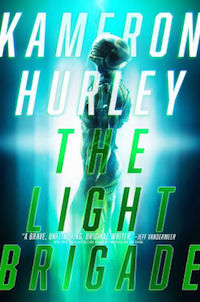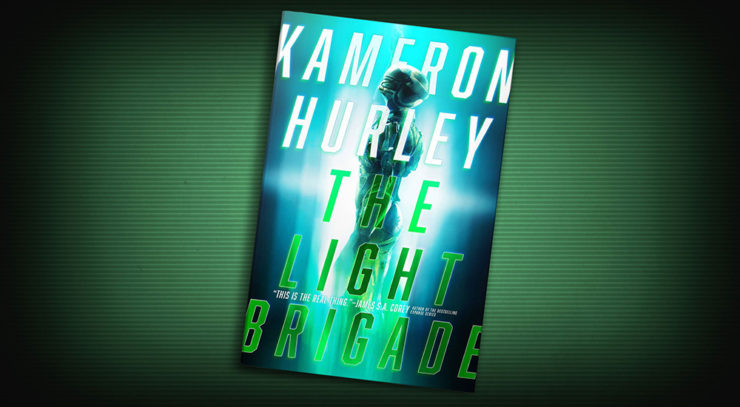It seems like we get one of these novels every decade or two—a retelling of Heinlein’s Starship Troopers with a modern twist of characterization, themes, or how the story is told, whether that’s time dilation, honest-to-goodness time travel, or bioengineering. Remarkably, not only do these retellings pop up regularly, but many, like Joe Haldeman’s The Forever War and Old Man’s War by John Scalzi, have gone on to become SF classics in their own right.
Kameron Hurley’s The Light Brigade is the latest in this line of novels to modernize Heinlein’s classic tale, and like those that have come before, it too is an important, critical look at the role of how war bends and warps modern society. It is also every bit as good as The Forever War and Old Man’s War, and has the potential to become the next great Military SF classic.
Dietz signed up for the army after São Paulo was “blinked” from existence by an attack from Mars, killing over two million people in one fell swoop. Like many, Dietz left abandoned dreams behind to join the army and sate a thirst for vengeance in Earth’s war against Mars. Only, Dietz’s experiences on military drops—which use new technology to turn soldiers into particles of light and beam them vast distances at lightspeed—don’t match up with the rest of her squad, and soon Dietz realizes that the the truth of the war against Mars—and everything else they’ve been told—is wrong.
Let me be up front about something: I don’t particularly like Robert Heinlein’s classic military SF, Starship Troopers. Sure, the film adaptation was schlocky fun, and the novel’s impact is undeniable, but the book itself lost me early on for several subjective reasons related to character, prose, and Heinlein’s politics. I am, however, a huge fan of novels that play off of the tropes and themes popularized by Starship Troopers, including the aforementioned books by Haldeman and Scalzi.
All this is to say that I’ve come to realized that, like any trope or classic story outline, execution is everything. The Military SF tale about a kid joining the war and fighting their bloody way through to grim realization is a classic for a reason, but characterization, and the lessons learned along the way, not to mention the author’s politics, are what get me truly excited about a story. Starship Troopers, The Forever War, Old Man’s War, and The Light Brigade are all very different in this regard, but they share similarities. Rico in Starship Troopers came across as a vehicle for Heinlein’s ideas, a lens through which the author could interact with his world and tell the reader what he wanted them to know. William Mandela from The Forever War always struck me as something of a cypher, similar to Rico in that way, but Haldeman’s anti-war themes, fascinating take on time travel/dilation, and the absolute scope of the novel, which covers nearly 1,200 years, all elevate the narrative to a truly special level. John Scalzi’s Old Man’s War, on the other hand, sacrifices theme for character, and I found myself intensely connected to its protagonist and narrator, John Perry—a 75 year old man transferred to a young body so he can serve in the Colonial Defense Forces. These experiences illustrate how important it is for these war narratives to have multiple facets for me to connect with.
Unlike The Forever War and Old Man’s War, which both pulled me in by emotionally attaching me to people or ideas off the bat, and then unfurling the war as the pages turn, The Light Brigade caused an immediate, visceral reaction in me as a reader. It’s like a punch in the gut from the first page. Hurley hounds the reader with a relentless pace, introducing them to a bevy of characters and never slowing down. It’s brutal from its first pages, and never lets up. As the pages turn, ideas pile up, and Dietz forms genuine relationships with her fellow soldiers, and Hurley does a beautiful job exploring how they deal with death, loss, risk, and release. Her prose is punchy, and the dialogue sharp and urgent, providing a feeling of really being down there in the trenches with the soldiers.
On the backs of authors like Heinlein, David Weber and John Ringo, Military SF, a genre that has a history of political and social conservatism, has traditionally been considered the dominion of men. Hurley, alongside writers like Elizabeth Moon, Tanya Huff, and Linda Nagata, is proof that not only is that a false narrative, but that Military SF can be aggressive, exciting, and bloody while also maintaining a progressive, critical opinion of war. And this is, perhaps, my greatest requirement for Military SF: these coming-of-age stories should be critiques of war. They should analyze the opportunity cost of war, and examine the short- and long-term social effects—otherwise they run the risk of becoming little more than glorified pew pew war porn. Perhaps such books have their place, but not for this reader. Haldeman’s The Forever War was a sharp critique of Vietnam. Old Man’s War, on the other hand, examines individualism and mortality within the larger war narrative. In The Light Brigade, Hurley rips into war’s many complex facets, while also showing how Dietz is affected on a personal level. Never does it trade its thematic explorations for character development or vice versa—they are one and the same.
It’s those who believe in something larger than themselves who thrive. We all seem to need a little bit of delusion to function in the world. That belief can be about anything, too. Could be a god, a corporation, a society, like our various militaries instill. A sense of belonging. Could be national pride. Or the desire to make the world a better place. Or see the world burn. Personal or political. But… something bigger. Something greater.
In perhaps Hurley’s most famous work, her Hugo Award-winning essay, “We Have Always Fought: Challenging the Women, Cattle, and Slaves Narrative,” (which, in the interest of full disclosure, I first published on A Dribble of Ink in 2013), she examined the erasure of the role of women in combat roles throughout human history. The Light Brigade, of course, is full of characters spanning humanity’s full spectrum, including plenty of female soldiers—but, perhaps the most interesting aspect is Hurley’s intentional obfuscation of Dietz’s gender until the very end of the novel. Doubling back to “We Have Always Fought,” one could wonder if Hurley is telling us that the role of women—and people from all ethnicities, sexualities, races, etc.—can play any role. It doesn’t matter if Dietz is a man or a woman because it has no bearing on Dietz the soldier. Hurley’s vision of the future is no doubt grim, and she deeply explores themes of violent xenophobia and cultural manipulation, but perhaps there can be some comfort in the way the relationships between Dietz and her fellow soldiers are not defined or restrained by bigotry. Homophobia appears to have died off in this future. Soldiers fight alongside other soldiers with different colored skin. There’s no instance in the novel where it’s suggested women are any less fit than men to be soldiers or leaders. In many ways, the only thing Dietz shares with her fellow soldiers is their role in the war—not their race, not their culture, not their history, not their class. They are who they are, and can fuck who they want to fuck, can dream what they want to dream—as long as they’re pointing their rifles at the right bad guys.
“War is hell.” So goes the old saying—but, perhaps a more accurate portrayal of Hurley’s message in The Light Brigade is: “War is a tool.”
The Light Brigade’s most chilling critique is its utter condemnation of capitalism. Nations do not exist in Dietz’s world. They have been replaced by the Big Six (formerly the Big Seven)—behemoth-sized corporations that act as employer, supplier, police, and government all at once. Hurley extrapolates from the late stages of capitalism that we see today, envisioning a future where these corporations use their overwhelming wealth and influence to shift towards an almost feudal-like system of governance, eventually collapsing the existing governments and taking full control. Amidst all this, Hurley examines the way governmental bodies and private corporations use mass media to control and manipulate the population under their umbrella, controlling a narrative that stokes fear, anxiety, and anger to a point that it becomes violent and bloodthirsty. Even someone like Dietz, who, early on, wants nothing more than to play sports and earn a citizenship, becomes enamoured by the idea of bloody vengeance in the wake of São Paulo’s destruction. Dietz recognizes herself becoming a tool for the corporation she hates—the corporation that destroyed her family. “The corporations fucked us over,” she tells the reader midway through the novel. “All their scheming and manipulating, all the propaganda and fear mongering led by people like Norberg. And yeah, me. I was part of this too. I was the fist attached at the arm of the corp.” (Ch. 24) If it seems far-fetched, one only has to tune into a cable news network or spend an hour on Facebook. All the clues are all there. Let no one say Hurley didn’t warn us.
The Light Brigade is a direct assault on the attack against democracy and freedom that we’re fighting right now.
“We darted down the ruined streets,” Dietz says. “I covered the rear, gazing back, always back, at what had come before.”
Buy the Book


The Light Brigade
Hurley’s known for her brutal and often weird brand of storytelling—sentient plants, organic generation ships, mirror universes, etc.—but, in many ways, The Light Brigade is a step away from her usual mode. Sure, it features a chilling outlook of the future, and is full of tech and big SF ideas, but in almost all cases they’re realistic evolutions of what we already see on Earth in 2019. Those who have perhaps been turned off by Hurley’s reputation for unconventional weirdness would do well to give The Light Brigade a shot. And then, use it as a jumping off point for the rest of her excellent bibliography. It stands to reason that if you enjoy The Light Brigade, you’ll also find a lot to like about The Stars Are Legion or The Mirror Empire, both of which share many elements with The Light Brigade, but ratchet up the weird to 11.
The Light Brigade is a standout novel in Kameron Hurley’s already impressive career. It’ll get your pulse pounding, your blood boiling, and your heart aching. It’ll make you angry, scared, and, at the most unexpected moments, hopeful. The history of Military SF novels is long and storied, but Hurley’s work can stand up with the best of them.
We kept going.
We kept going.
Because that’s what war is.
You keep going until it’s over.
Or you’re dead.
The Light Brigade is not just a critique of war’s past and present, but a dire warning of its future.
The Light Brigade is available from Saga Press.
Aidan Moher is the Hugo Award-winning founder of A Dribble of Ink, author of “Youngblood,” “The Dinosaur Graveyard,” and “The Penelope Qingdom,” and a regular contributor to Tor.com and the Barnes & Noble SF&F Blog. Aidan lives on Vancouver Island with his wife and kids, but you can most easily find him on Twitter @adribbleofink and Patreon.










